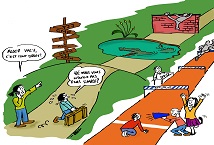- Home
- ESEC SCOPE
- Publications
- Preventing breaks in the child protection pathway
Preventing breaks in the child protection pathway
Visuel

Type of text :
Opinion and report
Type of referral :
Government referral
Working group :
Section for Social Affairs and Health
Date d'adoption
Date adopted : 06/13/2018
Rapporteur(s) :
Photo

Antoine DULIN
STUDENT BODIES AND YOUTH MOVEMENTS GROUP
Overview
Présentation
Young people under the protection of Aide sociale à l’enfance (ASE – Child Welfare) service do not figure in political or media agendas even though they are faced with a great many difficulties throughout their life pathways. In April 2018 the Prime Minister requested the ESEC to look into two special situations: That of “young people with multiple difficulties” and that of young adults.
“Young people with multiple difficulties”, who have sadly come to be known as “incasable” (unplaceable), are young people who have suffered serious negligence and violence that have disrupted their development, and who have encountered problems in several fields (education, health, forming relationships, recreational activities, etc.). They are not taken in anywhere for any length of time and are often shuttled from one institution to another. Such institutional mistreatment only serves to heighten their feelings of abandonment and impacts their ability to follow stable schooling and treatment of their psychological disorders.
When they leave the child welfare system, it is too often to fall into situations of precarity. A great many young adults are unable to obtain contrats jeunes majeurs (Cames – young adult contracts, providing financial aid and assistance) until they reach the age of 21, and when they do manage to obtain them, contract durations are extremely short (3 to 6 months). Such young people’s situation is paradoxical: they are asked to be more self-sufficient than other young people of their age when they have fewer resources (family, relational, psychological, financial, social etc.) to draw on.
The failing care provided to these two groups of young people is a real economic waste, given the public authorities’ investment in child protection (some 10 billion euros), and an educational and social absurdity as it often leads to loss of self-esteem both on the part of the young people concerned and the professionals whose job it is to assist them.
It is on the basis of this finding that the ESEC has drafted a series of recommendations designed to guide the future interministerial strategy on protection of children and teenagers (2018-2022), set to be implemented by the Government and départemental councils.
THE ESEC’S RECOMMENDATIONS
- Assessing and improving national and territorial management of the child protection policy;
- Developing statistical knowledge and research, in particular on young adults, disabled young people under protection, and young people from very poor families.
SECURING THE PATHWAYS OF CHILDREN AND YOUNG PEOPLE WITH MULTIPLE DIFFICULTIES
Starting on the pathway
- Improving prevention during early childhood, at school, in families and in third places, in order to deal with situations of educational deficiencies, abuse and developmental and behavioural disorders as early as possible, through full deployment of départemental protocols on prevention;
- Creating a national frame of reference for assessment of situations, applicable in each département;
- Introducing general medical examinations for children, to be incorporated into the Projet pour l’enfant (PPE – Projet for the Child);
- Improving vocational training in this field (in particular for family assistants) in order to ensure better management of pathways, by developing joint training programmes.
Accompaniment all along the pathway
- Setting up a nation fund for equalisation of expenditures on child protection and ensuring compliance with national standards in application of ASE measures in each area;
- Consolidating coordination of the social, medicosocial and disability sectors, making young people with multiples difficulties central to concerns in order to ensure better care and guarantee them right of access to the necessary services (schooling, (child-)psychiatry, etc.);
- Developing special reception offers meeting the needs of young people with multiple difficulties (facilities incorporating social, medicosocial and healthcare services, family assistants/therapists, drop-in centres, etc.).
PREPARING FOR AND SECURING THE END OF ASE PROTECTION
Guaranteeing assistance to young people leaving the ASE
- Responding to the urgency of the situation, either by amending common law and, subject to available resources, guaranteeing all 18-year-olds, whether or not they are leaving the ASE, continuing assistance towards integration combined with guaranteed resources, or by introducing a special right for young adults leaving the ASE, consisting of continued oversight and assistance up until the end of their education or their first long-term job (fixed-term contract of over 6 months or open-ended contract), cofunded by the State and départements;
- Guaranteeing access to accommodation by setting up a fund making money available for payments borne by residents at Foyers de Jeunes Travailleurs (FJTs – Young Workers’ Hostels) and by developing subleasing and semi-autonomous residential pathways.
Assisting young adults in their transition to self-sufficiency
- Securing the administrative pathway by systematic opening of digital resource facilities giving them access to their ASE files and guaranteeing opening of bank accounts;
- Implementing the access to autonomy protocol provided for by the Law of 2016 in each département in order to mobilise all actors in socio-professional integration on behalf of the young people concerned;
- Developing local mentoring and guaranteeing Associations Départementales d'Entraide des Personnes Accueillies en Protection de l'Enfance (ADEPAPEs – mutual aid associations of former ASE beneficiaries) permanent resources in order to set up networks of resource persons around the young people concerned;
- Ensuring that each département provides assistance to unaccompanied foreign minors (UFMs) enabling full enjoyment of their rights, access to work in particular.